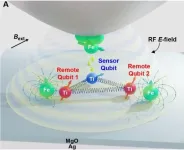(Press-News.org) When we’re married or in a long-term romantic relationship, we may eventually come to take each other for granted and forget to show appreciation. A new study from the University of Illinois Urbana-Champaign finds that it doesn’t have to stay this way.
The study examined why perceived gratitude from a spouse or romantic partner changes over time, and whether it can be improved through relationship intervention programs.
“Gratitude almost seems to be a secret sauce to relationships, and an important piece to the puzzle of romantic relationships that hasn’t gotten much attention in research studies until recently. And in couple relationships, it’s not just about being appreciative for your partner but also about feeling appreciated by your partner. Gratitude for couples is very interpersonal and something that is exchanged between partners,” said Allen Barton, assistant professor in the Department of Human Development and Family Studies, part of the College of Agricultural, Consumer and Environmental Sciences (ACES) at U. of I. and an Illinois Extension specialist. Barton is lead author on the paper.
The study analyzed data from a randomized controlled trial with 615 low-income, help-seeking couples who signed up for an online relationship intervention program. Both partners had to participate in order to qualify for the study.
Couples assigned to the treatment group in the study participated in one of two online relationship education interventions, OurRelationship and ePREP, both of which provide couples with principles and practices to better communicate, understand conflict, and address problems in their relationship. Each program ran for 6 weeks and included online lessons and activities, as well as periodic meetings with a relationship coach.
A control group was assigned to a waitlist and did not receive intervention until after the study was completed. The researchers collected data through surveys before program participation began and at two-, four-, and six-month follow-ups.
Barton and his colleagues first looked at factors that predicted lower levels of perceived gratitude among the control group. They found that individuals who felt less appreciated by their partner were more likely to be female, married, and have children. Older age was also associated with a decline in perceived gratitude over time.
“These findings make sense. When we first meet somebody, we’re very mindful to show our appreciation. Over time, this tends to get lost, and people may not realize that neither partner feels as appreciated as they would like to be. From other research we have done, we know that ensuring partners feel acknowledged and valued will go a long way in promoting the quality of their relationship,” Barton stated.
The researchers also found that, for those assigned to the control group, perceived gratitude remained at the same level throughout the duration of the study despite improvements in communication, satisfaction, and other relationship variables. Thus, while other aspects of the relationship may be more likely to fluctuate or increase, gratitude is not something that seems to improve by itself over time, Barton said.
But can it get better with some outside assistance?
To answer that question, the authors examined whether perceived gratitude increased by participating in either of the two online relationship interventions.
Results indicated couples in the intervention group did, in fact, report improvement in partner gratitude relative to individuals in the control group.
“We found that levels of perceived gratitude improved as a result of participating in these online relationship interventions, which have been shown to improve overall couple relationship quality across several dimensions. The effect on gratitude was not as large as program effects on some of the other aspects, which isn’t surprising because the program wasn’t focusing on gratitude, but there was still a measurable effect,” Baron explained.
Some relationship programs have been directed solely towards improving gratitude, but those have shown mixed results, Barton noted. When people express gratitude because they’ve been asked to do so as part of a program, it may come across as insincere and be less effective.
“Gratitude is a unique construct that seems to be lower in more established relationships, but it can be improved through efficacious relationship intervention programming. It has been an overlooked dimension that makes for healthy, supportive relationships. Our findings indicate we should develop programming that aims to improve levels of perceived gratitude, but it shouldn’t be the sole focus; it should be one component of the intervention,” he said.
Barton’s advice to couples is to be mindful of the power of saying “thank you.”
“If you’re married or in a romantic relationship, as simple as it may seem, make sure to regularly give specific, sincere compliments to your spouse or romantic partner. I also encourage couples to ask each other if there are areas where one person doesn’t feel appreciated and then work to remedy that,” he said.
“It takes a lot of work to make a family happen, and that work becomes all the more challenging when your efforts aren't acknowledged. So just ensuring there’s a regular rhythm in a relationship where both partners are expressing appreciation and both partners feel valued is important.”
The study focused on low-income couples, who were at or below 200% of the federal poverty line for a family.
“Financial strain can be a stressor for couples, and lower-income individuals tend to have higher relationship instability,” Barton noted. “Decades of social science research indicate that having strong marriages and couple relationships matters for individuals, for children, and for communities. A lot of factors influencing couple relationships are difficult to change but this–feeling appreciated by your partner–is one important factor that, as we show in this study, can be changed by effective interventions.”
Couples seeking help with their relationship can participate in the Strong Couples Project that is currently disseminating the ePREP program tested in this study. This project, offered through Illinois Extension and directed by Barton, is available free of charge to qualifying participants nationwide.
Editor's notes:
The paper, “Trajectories of perceived gratitude and change following relationship interventions: A randomized controlled trial with lower-income, help-seeking couples,” is published in Behavior Therapy [DOI: 10.1016/j.beth.2023.07.014]. Authors include Allen W. Barton, Qiujie Gong, Shayna Guttman, and Brian D. Doss.
This research was supported by Grant 90FM0063 from the U.S. Department of Health and Human Services Administration for Children and Families (ACF) awarded to Brian Doss.
END
Don’t feel appreciated by your partner? Relationship interventions can help
2023-10-05
ELSE PRESS RELEASES FROM THIS DATE:
Study confirms age of oldest fossil human footprints in North America
2023-10-05
The 2021 results began a global conversation that sparked public imagination and incited dissenting commentary throughout the scientific community as to the accuracy of the ages.
“The immediate reaction in some circles of the archeological community was that the accuracy of our dating was insufficient to make the extraordinary claim that humans were present in North America during the Last Glacial Maximum. But our targeted methodology in this current research really paid off,” said Jeff Pigati, USGS research geologist ...
More than 10,000 pre-Columbian earthworks remain hidden throughout Amazonian forests
2023-10-05
More than 10,000 Pre-Columbian archaeological sites likely rest undiscovered throughout the Amazon basin, estimates a new study. The findings, derived from remote sensing data and predictive spatial modeling, address questions about the influence of pre-Columbian societies on the Amazon region. “The massive extent of archaeological sites and widespread human-modified forests across Amazonia is critically important for establishing an accurate understanding of interactions between human societies, Amazonian forests, and Earth’s climate,” write the authors. ...
New, independent ages confirm antiquity of ancient human footprints at White Sands
2023-10-05
New radiocarbon (14C) and optically simulated luminescence ages have confirmed the controversial antiquity of the ancient human footprints discovered in White Sands National Park, and reported in a study in 2021. Addressing the widespread criticism of their previous study, researchers report that the independent ages from multiple resolved sources conclusively show that the footprints were left behind between roughly 23,000 and 20,000 years ago, demonstrating that humans were present in southern North America during the Last Glacial ...
Special Issue: Ancient DNA
2023-10-05
In this Special Issue of Science, three Reviews highlight how recent advances in the field of ancient DNA have greatly advanced our understanding of the evolutionary history of many plants and animals, including our own species. “This special issue examines the changing landscape of how ancient DNA (aDNA) is studied today, including previously untapped sources, improvements in technology, and ethical challenges, and what we’ve learned about ourselves though ancient DNA,” write Corinne Simonti and Madeleine ...
What are the risks of radioactive wastewater release – the next of which is October 5th – from Fukushima Daiichi nuclear plant?
2023-10-05
Wastewater release from the Fukushima Daiichi nuclear plant in Japan is expected to have negligible effects on people and the ocean, Jim Smith and colleagues report in a Perspective. The planned releases of radioactive wastewater, 350 million gallons of which has been stored at the site since the 2011 earthquake and tsunami that triggered the Fukushima plant’s meltdown, began in August 2023 and are expected to continue for perhaps the next 30 years. The second release is scheduled to start on October 5th. While the scheduled releases have sparked international concern, Smith et al. discuss the science behind the risks and ...
Discovery made about Fischer Tropsch process could help improve fuel production
2023-10-05
A fundamental discovery about the Fischer Tropsch process, a catalytic reaction used in industry to convert coal, natural gas or biomass to liquid fuels, could someday allow for more efficient fuel production.
Washington State University researchers discovered previously unknown self-sustained oscillations in the Fischer Tropsch process. They found that unlike many catalytic reactions which have one steady state, this reaction periodically moves back and forth from a high to a low activity state. The discovery, reported in Science, means that these well-controlled oscillatory states might be used in the future to enhance the reaction rate and the yields of desired ...
New discovery may ‘unlock’ the future of infectious disease and cancer treatment
2023-10-05
University of Birmingham News Release
STRICTLY EMBARGOED UNTIL 14.00 Thursday 5th October ET 2023/ 19.00 Thursday 5th October UK 2023
Researchers have identified a ‘guard mechanism’ for a protein which attacks microbes in infected cells, opening the possibility of new treatments for Toxoplasma, Chlamydia, Tuberculosis and even cancer.
A study, led by the University of Birmingham and published today (5th October) in Science has discovered the lock and key mechanism that controls the attack protein GPB1. GBP1 is activated during ...
Study shows prior exposure to common virus shields against birth defects and miscarriage
2023-10-05
Researchers at Tulane University have shown for the first time that mothers are much less likely to transmit a common virus known to cause miscarriages and birth defects if they are exposed to the virus prior to becoming pregnant. The study marks a significant step toward the development of a vaccine that could protect mothers and their babies.
Cytomegalovirus (CMV) is a common herpesvirus that most women contract unknowingly before reaching child-bearing age. It's usually harmless except during pregnancy when, if passed on to the developing fetus, it is a leading cause ...
A new qubit platform is created atom by atom
2023-10-05
Seoul, Korea - Researchers at the IBS Center for Quantum Nanoscience (QNS) at Ewha Womans University have accomplished a groundbreaking step forward in quantum information science. In partnership with teams from Japan, Spain, and the US, they created a novel electron-spin qubit platform, assembled atom-by-atom on a surface. This breakthrough was published in the journal Science on 2023/10/06.
Unlike previous atomic quantum devices on surfaces where only a single qubit could be controlled, the researchers at QNS successfully demonstrated the ability to control multiple qubits simultaneously, enabling the application of single-, two-, and three-qubit gates.
Qubits, ...
Brain is ‘rewired’ during pregnancy to prepare for motherhood
2023-10-05
Francis Crick Institute press release
Under strict embargo: 19:00hrs BST Thursday 5 October 2023
Peer reviewed
Experimental study
Animals
Researchers at the Francis Crick Institute have shown that pregnancy hormones ‘rewire’ the brain to prepare mice for motherhood.
Their findings, published today in Science, show that both oestrogen and progesterone act on a small population of neurons in the brain to switch on parental behaviour even before offspring arrive. These adaptations resulted in stronger and more selective responses to pups.
It is well known that while virgin female rodents do not show much interaction with pups, ...





